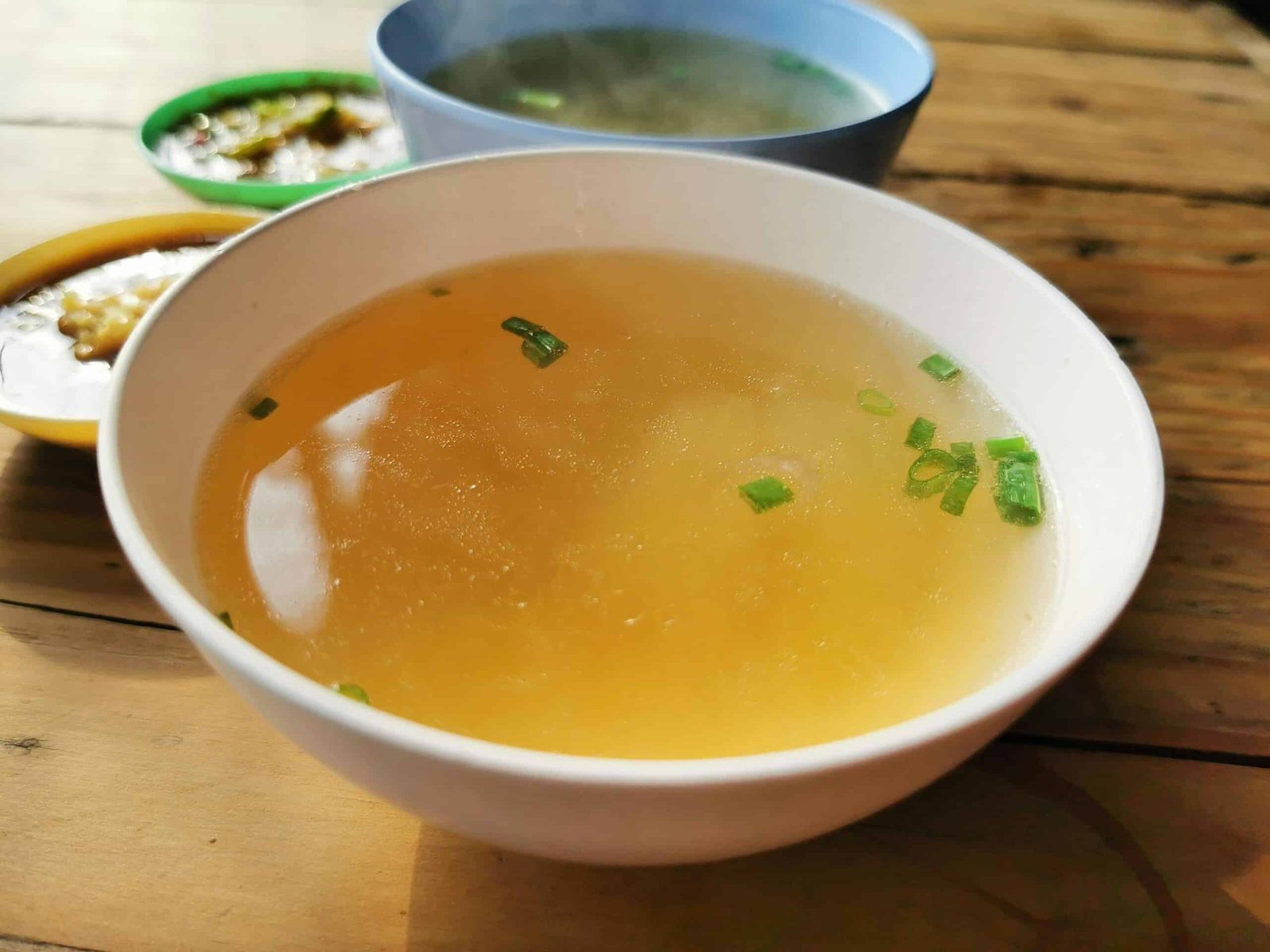A lot of people use chicken broth or beef broth for cooking. Are you bone brothing too yet? No longer used just in cooking, bone broth is now something people are implementing into their daily health regimen. Bone broth has seriously become the fad food of our health and wellness community. Several people, from fitness enthusiasts to master chefs are all praising its benefits. But what’s behind the hype? How has this age-old remedy mysteriously benched the new favorite of modern wellness?
If you are thinking of starting to drink bone broth like me, an alternative question might be “what is bone broth?” and/or even what kind of benefits one gets from sipping the stuff. Well, before you start adding it to your daily health routine, here are pros & cons of bone broth and how to choose the best bone broth to consume.
So let’s get started.
Disclosure: This post may contain affiliate links and I may receive a small commission if you purchase through them. There is no additional charge to you.
Bone Broth 101: What is Bone Broth and Why the Craze?
So what is bone broth? How is Bone broth different from chicken or beef broth? Yes, bone broth is a much more substantial source of protein (more than both chicken or beef), collagen powders and electrolytes as well cellular nutrients, vitamins & minerals. Chicken and Beef broth may be good for cooking, but bone broth is much concentrated and delicious and has high nutritional benefits.
Bone broth is a liquid containing brewed bones and connective tissues that typically simmered over 24 hours. The slow-cooking process breaks down the bones and tissues that help release proteins like collagen, amino acids, essential minerals, and potassium that may be absorbed easier by the body to reduce inflammation on the gut lining.
Bone broth is something that has been consumed for centuries by our ancestors and traditional cultures alike. The art of bone broth is an ancient culinary practice that has been handed down through generations. This is why bone broth goes further than just soup bases.

Then, how in the world did bone broth all of a sudden become so popular?
It has been a staple in many cultures for generations, but it has been brought back to life via health movements such as the paleo community and all around general better living through what you eat (a.k.a one of the Kardashian sisters endorses this). Bone broth is packed with nutrients, vitamins, minerals, amino acids, and essential fatty acids. The longer you cook or simmer the bone broth, the more nutrients are released.
This is due to the increasing knowledge involving its positive health effects, leading it to be a highly recognized product. Proponents of bone broth might argue that it has anti-inflammatory effects, improves gut integrity, and is a natural collagen for skin. Bone Broth is especially appealing for those following a diet that are high in nutrient-dense foods (e.g., paleo, keto) since it naturally complements the goals of these diets.
In this context, it is present and the lifestyle movement that marked its era by becoming versatile and useful as a standalone drink or as an ingredient for soups or stews. By consuming bone broth regularly, some say it will help with digestion, sleep problems, and also can boost energy levels.
The revitalization of bone broth gets a much larger conversation about our need for nutrient-dense foods. This appears to be more than just another fad or health craze but rather a broader trend towards holistic health and nutrition in general as traditional foods are re-examined and respected for their continued benefits.
The Benefits of Bone Broth
Bone Broth’s nutritional value is one of the biggest reasons for its popularity. It has an impressive nutritional profile. Here is a closer look at why bone broth is so powerful in nutrition.
- Source of Collagen and Gelatin: Collagen is a protein that occurs naturally in connective tissues, which means it helps keep our skin plump and hydrated as well as giving our hair its shine. When bone broth simmers, tendons and ligaments release collagen which turns into gelatin in the body — this supports healthy digestion as it draws water to the gut.
- Loaded with Minerals: Bone broth contains important minerals such as calcium, magnesium and phosphorus. They are required for bone development, muscle function and general wellness.
- Amino Acids: Bone broth is a rich source of amino acids like glycine, proline and glutamine. These amino acids help in the repair and growth of muscles, detoxification and helps to support a healthy immune system.
- Gut Health Hero: The gelatin in bone broth supports your gut lining and can help reduce gastrointestinal issues — including leaky gut syndrome — making it an ideal food for those with intestinal problems.
- Provides Joint and Bone Support: Collagen is found in all of the body’s connective tissues; it can help to reduce joint pain and inflammation when taken regularly. So it is the best choice for sports enthusiasts and people who have arthritis as well.
Bone Broth is a Nutritional Powerhouse
One of the reasons bone broth has been gaining a lot of traction is because of its impressive nutritional profile. Here are some beneficials of bone broth:
1. Bone Health
Bone broth is the superfood of all time, It helps to improve overall wellness. The biggest benefit is that it maintains bone health. It provides calcium, magnesium, and phosphorus, which is a great source of minerals that are crucial for bone health to maintain its density and strength. Bone broth is an excellent dietary supplement for osteoporosis and other bone-related diseases, as they are easily absorbed by the body. With the regular consumption of bone broth, we help keep our bones dense and well rounded so they last us a long time.
2. Sleep and Relaxation

The amino acid like glycine in bone broth helps promote relaxation and sleep. It acts as an important neurotransmitter that can help boost quality sleep. It inhibits certain excitatory neurons in the brain and has been used for years as a mild sedative. Bone Broth can help reduce our body temperature and helps you to sleep faster and longer. Consuming a mug of bone broth before you sleep is like giving your body a hug and whispering in its ear that: “It’s time to sleep better, be kinder.”
3. Immune Support
Bone broth is high in various types of proteins and boasts an array of vitamins and even collagen, making it a superfood for the immune system. It is directly related to the high amount of minerals (calcium, magnesium and phosphorus among others) which are important for a well functioning immune system. They are essential for the general immunity of the body and help in strengthening it against infections.
Moreover, bone broth is a source of immune-supportive amino acids like arginine, glutamine & cysteine. This is particularly important because most of our immune system lives in the gut, and specifically supports your gut lining. An intact gut barrier prevents the passage of impurities and pathogens into the bloodstream, contributing to a better immune system.
Also, bone broth provides our bodies with gelatin that is converted into collagen in the body. The Collagen in the gut is also responsible for the structure and integrity of our gut lining, which reduces inflammation in addition to aiding a healthy digestive tract. This is important because long-lasting inflammation can deplete your immune system, weakening it and making your body more prone to illnesses.
The amino acids contained within bone broth have an anti-inflammatory effect that also helps to regulate the immune response, ensuring it is functioning well. By adding bone broth to your diet, you can provide your immune system with the boost it needs in order to ward off harmful pathogens and help maintain a healthy body by consuming essential vitamins that are natural, easily digested.
4. Digestion and Gut Health

Bone broth is often credited for promoting good digestion and gut health thanks in large part to its gelatin and amino acid content. Collagen (from which gelatin is derived) helps to heal and seal the gut lining. This is important because an impaired gut lining can result in serious problems similar to leaky gut syndrome where partially digested food particles and toxins move out of the intestine into the blood process leading towards inflammation which contributes greatly to various health-related ailments. Bone broth can seal these gaps by then creating a better environment in your gut lining to absorb more nutrients and provide an overall healthier digestion process.
Bone broth is also full of amino acids like glutamine, glycine and proline that are the building blocks for a healthy functioning gut. In particular, the amino acid glutamine is essential cell fuel for gut lining cells to help repair and generate new mucosa. Glycine assists in gastric acid production, which is essential for adequate digestion and breaking down our food.
It Promotes the Proper Digestive System by which Nutrients are absorbed adequately and Waste is Eliminated Optimally, Reducing chances of digestion-related disorders such as bloating, constipation & Irritable Bowel Syndrome (IBS). Substituting bone broth in place of other broths, not only will improve the health and vitality that our gut microbiomes need to thrive but also give your enterprise level approach well-being a jump start.
5. Joint Health
Joint health is another significant benefit that bone broth offers. Thanks to the high collagen, gelatin, and various amino acids, it provides a crucial protein component for your cartilage, the rubbery cushion between our joints. Collagen levels in the body will decrease with age and can lead to joint pain if not enough cartilage in between your joints. Drinking bone broth helps you to get his vital protein, and may improve symptoms of joint pain and help your joints to function better.
Bone broth also provides glucosamine and chondroitin, both of which are recognized for their ability to support healthy joints. These elements can help to alleviate inflammation and also support the cartilage repair as well as maintenance. In addition, the amino acids present in bone broth which include proline and glycine help to maintain strong joints as it supports the body’s ability to make new collagen and decreases inflammation. Consuming bone broth on a regular basis ensures that your joints have the necessary nourishment needed to maintain and rebuild its elasticity, enabling you avoid wear-and-tear joint problems.
6. Anti-Inflammatory Properties
Rich in amino acids, minerals, and other bioactive compounds that will do wonders for you (hello inflammation fighting bone broth!), Glycine, an amino acid found in high quantities of bone broth is also beneficial for reducing inflammation. Glycine modulates the inflammatory response by reducing pro-inflammatory cytokines, these are signaling molecules involved in inflammation. It is essential in controlling chronic inflammation linked with arthritis, heart diseases or autoimmune disorders for instance.
Another important factor that helps thicken bone broth, and which supports its anti-inflammatory properties are gelatin (which is a protein derived from collagen). Gelatin also helps to heal the gut lining, which means a decrease in inflammation located there.
The gut is home to much of the immune system, so managing a healthy balance in this niche will help control systemic inflammation. It follows that bone broth contributes to a reduction of the amount of general inflammation in your body by promoting gut health.
Bone broth also contains minerals such as magnesium, calcium and phosphorus which can help reduce inflammation. It also has a role in the inflammatory response modulation, especially magnesium. Ensuring proper magnesium intake may also lower tags of chronic inflammation, which can improve health generally. These vitamins in mineral form deliver a natural and bioavailable bounty from Mother Nature that act together like team players to quiet down inflammation.
Also packing glucosamine and chondroitin typically utilized for joint pain/arthritis relief, in addition to some other things. These are caused by lower inflammation in the joints which provides relief from pain and increased mobility following compound rehabilitation. So, sipping on a cup of bone broth daily is one way in which you can naturally support joint health and reduce inflammation resulting in your achieving better overall health.
7. Skincare
One of the most popular beauty food trends, probably because it works wonders for skin health is bone broth. Collagen is the protein that makes skin bouncy and elastic. The production of collagen in our body decreases as we age, and thus causes wrinkle formation around the face area; which affects a saggy skin. This can occur due to the consumption of collagen-rich bone broth, where products such as Viapro are an aid in continuing adequate supply of exogenous protein that promotes smoother and more youthful skin. In addition, bone broth is rich in collagen that helps to maintain skin hydration, a key factor for glowing youthful skin.
Bone broth contains a lot of other nutrients beneficial for the skin, not just collagen. These amino acids, glycine, proline and hydroxyproline are necessary for collagen production and wound healing. Glycine, on the other hand; is involved in detoxifying the skin & promoting tissue repair. This amino acid is also an anti-inflammatory that calms the skin to clear it of irritations and redness.
Because bone broth is full of minerals like zinc, magnesium and calcium — all the things most people’s skins react well to. Zinc helps heal wounds and is effective in treating inflammatory acne by balancing oil production, decreasing inflammation. Magnesium helps to keep your skin firm and moisturized, while calcium supports the function of a healthy skin barrier, providing protection from environmental stressors and preventing water loss. These minerals work synergistically to support skin health, which is why bone broth can be such a complete approach for holding onto your youthful glow.
In addition, the gelatin contained in bone broth helps to increase skin elasticity and moisture. Gelatin — Gelatin is a cooked form of collagen that will go to promote your growth in natural production. This does not just make skin look better, but also aids in reinforcing the protective skin barrier to hold on more moisture and prevent external aggressors. Adding bone broth on a regular basis to your diet gives you an easy and effective way of optimizing the overall health of your skin through enhancing its inherent beauty.
8. Blood Sugar Control
Bone broth is a great tool to help keep the blood sugar stable from its nutrient density. Bone broth is a rich source of glycine which has multiple potential benefits in helping to control our blood sugar levels. Glycine is an amino acid that has been shown to increase insulin sensitivity and make it easier for cells in your body to absorb sugar from the bloodstream. Because it supports increment sensitivity, glycine aids in keeping blood sugar levels stable and avoids high peaks or falls that are particularly useful for those with insulin immunity (pre-diabetics) or type 2 diabetes.
Bone broth is also a low-carb, high protein food. Protein takes more time to digest and slows the absorption of glucose into your bloodstream, leading to a steady energy source which means you have no issues with those rapid hikes in sugar levels. The gelatin in bone broth also helps the gut lining and aids nutrient absorption and metabolism. Improved gut health function can in turn reduce the amount of glucose that is dumped into your blood from entering portal circulation, which also serves to keep better control on high sugar.
Additionally, bone broth supplies some of the most important minerals our bodies require which includes magnesium and calcium both needed for healthy metabolism. In specific magnesium has a significant impact on glucose metabolism and insulin purpose. Sufficient magnesium levels correlates to decreased insulin sensitivity and lower fasting blood glucose. When you include bone broth in your diet, it is providing the ingredients for your body to get natural traces of Magnesium (supporting metabolic health and blood sugar regulation).
Bone broth also has the added benefit of providing some anti-inflammatory properties which may help improve blood sugar levels. Insulin resistance is a hallmark of metabolic diseases and is often intensified by chronic low-grade inflammation, consequences that are closely related to one another. Amino acids and other anti-inflammatory compounds in bone broths such as glycine can help to calm an inflamed body, which could resultantly support better insulin sensitivity and more balanced blood sugar regulation. This will improve the blood sugar profile more effectively and over time thereby supporting overall metabolic health.
Kitchen Basics Original Chicken Bone Broth, 8.25 oz (Pack of 12)
Pacific Foods Organic Unsalted Chicken Bone Broth, 8 oz Carton (Pack of 12)
Potential Disadvantages of Consuming Bone Broth
Bone broth has had a lot of time in the spotlight as well for its alleged health benefits, however it is important to also discuss the cons or undesirable side effects from consuming bone broth. What is at least somewhat troubling is that there are such high nutrient levels in bone broth.
For example, if you take too much calcium and phosphorus minerals then it can lead to some imbalance which may be the reason for a few problems in upcoming days. Maintain a Moderate Diet in Order to Keep Nutrient Levels in Check.
Bone broth is safe to consume, and while it can be incredibly healthful, there are a few trade-offs you should consider:
1. Very High in Calcium and Phosphorus
Bone broth is lauded for its health benefits, but it’s not without a few drawbacks — especially in terms of calcium and phosphorus. One of the primary concerns is that consuming excessive amounts of bone broth can lead to an imbalance in these minerals. Bone broth is rich in both calcium and phosphorus, and while these minerals are good for bone health, too much consumption can lead to weakened bone overtime.
This imbalance can be especially serious for people with kidney problems because they have difficulty controlling the balance of phosphorus and calcium in their bodies.
It could also lead to another major bad effect, vascular calcification — calcium deposits in the blood vessels. This can boost the chance of getting cardiovascular diseases Those who are already at risk of heart disease or those with severely impaired kidney function should avoid taking in bone broth by the gallon, as it could get dangerous over many cups.
Note: Bone broth should be consumed in moderate amounts alongside other calcium and phosphorus containing foods, if you have a health condition that could be exacerbated by mineral imbalances like arthritis, etc.
It is also worth noting that bone broth should be consumed in moderation. Although it can provide many health benefits such as helping to maintain healthy joints, supporting digestion and promoting optimal skin, you also must be careful of the potential for mineral imbalance that could arise from excessive intake by balancing in your diet for overall well-being.
2. Heavy Metal Contamination
MaIn addition to being a healthy food, bone broth may have its drawbacks in relation to contaminants such as heavy metals. Heavy metals such as lead, cadmium and mercury can build up in our bones over the years. This means that trace amounts of those metals can whoost into the broth whilst cooking, possibly contaminating your drink. Widespread use of bone broth with high heavy metal concentrations and vulnerable population (pregnant women, small children, unhealthy) poses a health risk.
One of the biggest threats is lead exposure, which can result in severe health problems such as brain damage and kidney failure. Bone broth, as the studies show, can be a source of lead (yes there are measurable amounts and it may accumulate if ingested in high doses). In order to prevent this sourcing bones from organic, grass-fed animals that are reared in clean environments is critical otherwise you will be ingesting higher concentrations of heavy metals.
Also, be aware that bone broth is meant to be consumed in moderation. Heavy metal exposure would not likely be dangerous in the context of a balanced diet, but relying on it as your primary source of nutrition can lead to heavy metal overexposure However, this risk can be mitigated simply by eating a diverse amount of food and including several protein sources. However, paying attention to the type and origin of bones used in this process can result in lower chances of heavy metal contamination; meaning you will be able to have a nutritious meal while ensuring your wellness at its fullest.
3. Histamine Intolerance
Another important thing to consider too is allergies and sensitivities. Again, depending on what is in the bone broth can lead some people to react if there are certain traditional recipe ingredients like garlic or onions. Bone broth has a high histamine content, which can be problematic for people with a condition called histamine intolerance. Histamine is something present in some foods naturally, common culprits are aged or fermented items and imbalanced bacterial-fermented foods (like long-simmer bone broth).
The main issue is that not everyone can break down these byproducts efficiently and for some people, the simple act of eating a histamine rich food will cause this substance to build up causing severe headaches, flushing, hives swelling itchy skin; even if they are asymptomatic at other times.
When cooked for a long period of time, bone broth can be very high in histamine due to the breakdown of proteins when simmering. Unfortunately, all of this is bad news for people with histamine intolerance, which can make the symptoms reappear or an elevation on a reaction based in histaminergic routes. The more it is cooked or stored, the higher histamine levels can be developed. Therefore, individuals who suspect they have histamine intolerance or have been diagnosed with it might want to be careful consuming bone broth and keep an eye on their symptoms.
Some tips to reduce the risk of histamine intolerance with bone broth include: using fresh bones, simmering for less time and consuming within a day or two rather than storing it long-term. Further, it is also recommended to vary food sources and include other low-histamine foods in the diet to prevent symptoms from developing. A
lways speak to a healthcare provider or registered dietitian for personalized advice and before making big changes in your daily routine, especially if you have issues when it comes to histamine intolerance. They can assist with how best to navigate the potential benefits of an option like bone broth into less-dense food choices.
4. High Sodium Levels
What is high about bone broth, however, is its sodium. While that sodium may leach out from the bones — particularly if they are long-simmered to get all those vitamins, minerals and flavor into your broth in the first place- as it simmers away on even a low heat for hours or days. The same thing occurs and the result can be a fairly salty broth when compared to other foods.
Large amounts of bone broth could push sodium intake over the recommended daily limits. Some of you may be important to watch salt levels — like folks with high blood pressure or cardiovascular issues. Over time, a diet that’s high in sodium can lead to fluid retention and higher blood pressure — which puts extra stress on your heart and kidneys.
Those who are consuming a high-sodium diet should consider the sodium content in their total of all sources, including bone broth, or look to alternatives with lower levels.
However, it is important to use less salt in its preparation or look for low-sodium broth options before buying commercially packaged bone broth. You can also skim off some of the fat that floats to the top of any broth once it’s reheated, which helps to reduce your sodium intake.
While increased sodium consumption may not be ideal for many, you can counteract it by ensuring your diet consists of bone broth and potassium-rich foods (like fruits and vegetables) to reduce the risks mentioned above.
So in conclusion, while bone broth may provide some possible advantages to better health, it is always good practice to know the potential drawbacks before jumping on board with any one specific dietary addition.
Ways to Include Bone Broth in Your Diet
Adding bone broth as part of your daily routine is an easy and delicious way to greatly improve the quality of life. How much bone broth you consume will depend on your personal health concerns, dietary needs and goals. Bone broth need not be consumed daily to get benefit for most individuals (and in fact frequent consumption could contribute to excessive intake of certain minerals or histamine), however including bone broth for a couple times a week is going to result in health benefits rather than nutritional detriments.
This means that you can eat bone broth and still keep your diet fun by enjoying more variety in the foods you consume.
For those who want to support joint health, digestion or general well-being, drinking bone broth 2-3 times/week may be helpful. The continued use of bone broth can help all that good collagen and amino acids, and minerals work its way into your joints creating some awesome ant-aging effects over time, improve digestion or keep skin from sagging.
I know it’s crazy right! Plus, it adds taste to a meal or can also help as a drink in between meals. If you have special health issues or are concerned about your sodium intake and histamine intolerance it is better to avoid using bone broth. You can also look for low-sodium bone broth.
In the end, listening to how your body reacts is everything; eat more when you need and less when you do not. Although it is rich in the key amino acids and minerals needed for connective tissue repair, you should not use bone broth as a sole source of nutrition. Researchers say that to obtain sufficient balance each day we all need approximately 20 essential nutrients from other foods than this or any single type alone. Individual health needs and dietary preferences can be addressed by a medical professional or dietician.
Choosing the Right Bone Broth
There is no such thing as the same bone broth. This is what you should be on the lookout for when it comes to picking up a quality bone broth.
- Organic and Grass Fed: Look for broth made only from organic, grass-fed/pasture-raised/sustainably sourced animals to get the most amount of nutrients and lower risk of contaminants.
- Ingredients: Make sure that the bone broth you use in your recipe just uses a simple, clean ingredient. Stay away from the ones with added preservatives, artificial flavors or high sodium.
- Transparency business model: It’s important to select bone broth that you know where it’s from, where they’re sourcing and how they prepare the bone broth. This transparency is a good sign of quality.
- Gelatinous texture: After chilling, a quality broth will resemble Jello (thanks to the natural gelatin content in all those bones).
Flavor and Smell: This can sometimes be a matter of personal preference, but a wonderful bone broth has a deep umami taste along with an appealing odor.
Choose bone broth very wisely — quality does matter. Read labels carefully. When purchasing bone broth, look for a clean label with minimal ingredients and avoid bone broths that contain added preservatives or artificial flavors. This will make sure you are getting ONLY food that fits into your health plan just for YOUR HEALTH!
There are a lot of ways to eat bone broth. The most direct and effective way to use this remedy is by drinking it straight (definitely in the morning or evening as a hot drink) Bone broth, however, can be used in a thousand different ways! It makes for an excellent soup or sauce base and incorporates the missing collagen into your diet. Also, use more bone broth in hot dishes such as risottos and grains but also think cold where you can easily add them to smoothies increasing your intake while adding yummy health benefits.

Making bone broth at home is a great option for people who like to be more hands-on. First of all, you will get really fresh and real bones from the high-quality organic free range grass fed animals. Add the bones to a pot, and if you desire (this is optional), add water plus an onion, garlic cloves + some of your choice of vegetables / herbs. Boil the mixture for 12-24 hours and allow the nutrients to come out in liquid form completely. Strain and store stock in the fridge or freezer for use throughout the week.
These simple ways of integrating this bone broth into your diet will help you easily get all the benefits from it, without having to spend excessive time and effort. Given its flexibility and simplicity, bone broth is a worthwhile inclusion in any eating plan.
Final Thoughts
The rise in popularity of bone broth is no accident. With the host of health benefits backed by thousands of years, and now by modern science too, it is a super food that deserves to be incorporated in any diet. If you are looking for ways to improve your gut health, support chiropractic care at Proactive and overall well being then bone broth is the nutrient-dense superfood that works! So just beware and choose well, quality over quantity considering the source to get all the benefits from this wonderful potion. Enjoy your cup of broth!









